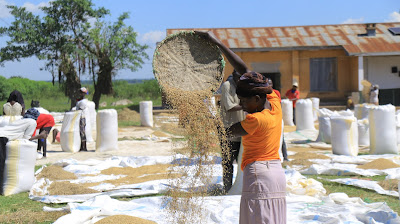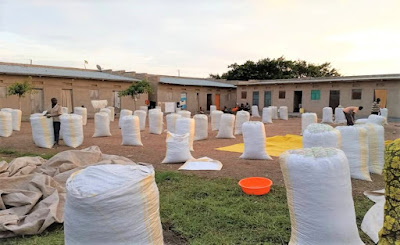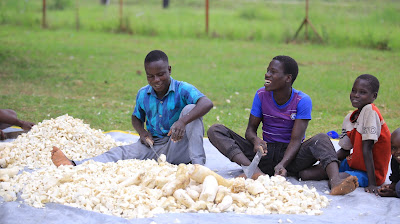MAALF/ACDP earmarks 6.4BN for small works to improve Farm Road Access
Rural economies in most African countries are primarily
agrarian with minimal supply chains and inadequate infrastructure to enable
access to markets. Most markets for food products are more than two to five
hours away from farm households and this is a serious constrain to
transportation of produce and movement in general.
In Uganda, the poor state of community access roads is often
escalated during the heavy rain seasons, when rural road bridges are washed
away and roads become impassable thus disconnecting farmers from potential
market areas. The
spoilt road sections are often referred to as chokes that impede the
regular
movement of motor vehicles, motor cycles or even people. These road chokes are
a major challenge to the inflow and outflow of commodities to and from rural
farming communities.
 |
Effects of heavy rains on Nabitende -Bwengo road in Iganga
Cluster
|
Through the ACDP
sub-component 2.3, technical and financial support has been ear marked for
small works to make farm roads accessible at community level and usable for the
movement of commodities. The major activities of this sub- component include;
¨ Mapping
of high production areas.
¨ Selection
and prioritization of the roads to be rehabilitated by cluster multi
stakeholder platforms.
¨ Identification
of potential site-specific Environment and Social Risks and Impacts.
¨ Preparation
of detailed designs and bills of quantities for selected roach chokes.
¨ Rehabilitation
of road chokes and
¨ Supervision
of works by the MAAIF teams.
An
average four roads have been identified by the district committee teams for the
five pilot clusters per district and the corresponding road chokes. A total of
794 road chokes have been prioritized and 6.4 billion Uganda shillings ear
marked to fix the road chokes.
Environmental
and Social Safeguards assessment of potential sites was conducted in the five
pilot clusters to identify gaps and prepare the host communities where works
will be undertaken in the areas of Gender Based Violence and Violence Against
Children. To handle any complaints by project-affected people, Grievance
redress committees have been sensitized to handle such cases as they arise.
For
the five pilot clusters, field surveys were undertaken and information
collected which guided development of drawings, technical specifications, bills
of Quantity and road section profiles.
From
the designs, cost estimates for the rehabilitative works were developed and
used in the prioritization of roads to be worked on.
The
advert to procurement contractors to rehabilitate roads in the pilot districts
was run on November 17, 2019. However, the heavy rains of late last year
resulted into floods that damaged roads and other infrastructure. This has necessitated the need to revise and
update the Bills of Quantity to replace the earlier approved ones.
As
a result, the estimated costs of the works in the pilot districts increased
from UGx 6,400,750,020/= (approximately USD 1.73M); as assessed in April 2018
to UGx 13,219,237,150/= (approximately USD 3.57M). This double increment is
attributed to the long period over which the road conditions have progressively
deteriorated.



Comments
Post a Comment